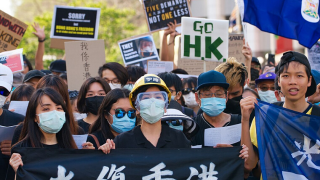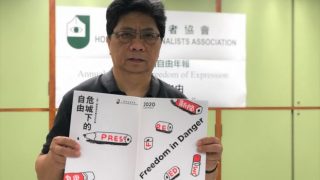As Australia relaxed visa rules for thousands of Hong Kong residents studying and working in the country, analysts say many more will likely emigrate from the city in the wake of a draconian national security law imposed by China following months of pro-democracy protests.
New regulations took effect in Australia on Monday granting automatic five-year visa extensions to 14,000 skilled migrants and graduates from Hong Kong residents already there, with a pathway to permanent residency at the end of the five years.
Future applicants who fill gaps in Australia’s labor market will also have the option of applying for visa extensions and residency.
Analysts told RFA they expect a growing number of Hongkongers to take advantage of that offer, as well as relaxed immigration rules offered by the U.K. and the democratic island of Taiwan.
Hong Kong political commentator Sang Pu estimated that more than 10,000 local residents will take advantage of Taiwan’s fast-track humanitarian offer to migrants fleeing Hong Kong, which recently saw a draconian state security system put in place under Beijing’s direct control, and with the involvement of mainland China’s feared state security police.
He said anyone with assets will likely move them offshore, and many won’t return to live in the city either.
“Hong Kong will never be the same again,” Sang said. “Xi Jinping is intent on defeating Hong Kong now.”
National Security Law
The imposition of the National Security Law for Hong Kong on July 1 launched a crackdown on peaceful dissent and criticism of the government in schools and colleges, in the media and on the streets.
The law bans secessionist, subversive, and terrorist words and deeds, as well as collusion with foreign forces to interfere in Hong Kong’s internal affairs, charges which carry a maximum sentence of imprisonment for life.
On Aug. 10, Hong Kong police arrested pro-democracy media tycoon Jimmy Lai for “collusion with foreign powers” and raided the newsroom of his flagship newspaper, the Apple Daily.
Charges of “collusion with foreign powers” appeared in the law after repeated claims from Beijing that last year’s anti-government and pro-democracy protest movement was instigated by “hostile overseas forces.”
“It is not just the Democratic Party and the Hong Kong Alliance in Support of Patriotic Democratic Movement in China, or the Hong Kong Professional Teachers’ Union that are in trouble; it is the whole community,” Sang said.
“Because everyone took part in the anti-extradition movement,” he said in a reference to mass public protests over plans by chief executive Carrie Lam to allow extradition to mainland China.
“The state security police are now operating in Hong Kong, national security education is in full swing, and there are national security courts,” he said.
“It will be the same as the purge on human rights lawyers and rights activists in mainland China,” Sang said.
Recent emigre
A YouTuber from Hong Kong who gave only the nickname Eagle said she emigrated to Taiwan after witnessing the way riot police deployed tear gas, pepper spray and “non-lethal” bullets against mostly unarmed demonstrators during last year’s protest movement.
“I burst into tears when the woman paramedic got shot in the eye on Aug. 11, because … [I knew] Hong Kong had changed,” Eagle told RFA. “Why is Hong Kong so dangerous now? I couldn’t allow myself or my family to remain in such a dangerous place.”
“Now that the National Security Law has been implemented, I feel that I have done the right thing,” she said. “First of all, the law is targeting more and more Hong Kong people, and secondly, the threshold for immigration in Taiwan has been raised, so if I had tried to move now, I might have missed the boat.”
A total of 5,858 Hongkongers have already made the move to Taiwan this year, with around 500 continuing to make the move each month in the first seven months of this year. Online queuing systems to apply to move there are full, and have been extended in a bid to accommodate the exodus.
Veteran hedge fund manager Victor Ng said people are already moving their money offshore.
“The most commonly used offshore accounts are Citibank, DBS and Singapore Centre,” Ng told RFA. “People want to be free to do as they please as long it doesn’t harm anyone, so they’re going to leave Hong Kong for freer countries.”
“[Socioeconomically], anyone from the middle class upwards will leave, and consumption will fall, and all sectors will be hard hit,” he said. “Our universities, which were ranked among the top 1,000 globally, will go the way of those in mainland China.”
‘Repopulating’ Hong Kong
Ho-fung Hung, associate professor of sociology at Johns Hopkins University in the U.S., said the ruling Chinese Communist Party has likely already factored in the exodus into its plans.
“The whole idea was that they wanted to keep Hong Kong but not its people,” Hung said. “They can repopulate it, because Hong Kong still has value for them as an offshore financial center.”
“But it won’t do them much good, because the rest of the world is already treating Hong Kong like the rest of China, legally speaking, so they are shooting themselves in the foot,” he said.
Reuters reported on Monday that Hongkongers are buying up property in the U.K., sending prices rising in some locations by as much as 15 percent since April.
Property agents told the agency they had sold more than double the number of apartments to Hong Kong buyers in the past two months, mostly as family homes rather than for renting out to tenants.
The U.K. government has offered some three million British National Overseas passport holders in Hong Kong a path to British citizenship, while a weaker pound and a stamp duty holiday have increased the attractiveness of U.K. property.
Reported by Gigi Lee and Tam Siu-yin for RFA’s Cantonese Service. Translated and edited by Luisetta Mudie.
Source: Copyright © 1998-2016, RFA. Used with the permission of Radio Free Asia, 2025 M St. NW, Suite 300, Washington DC 20036. https://www.rfa.org.



